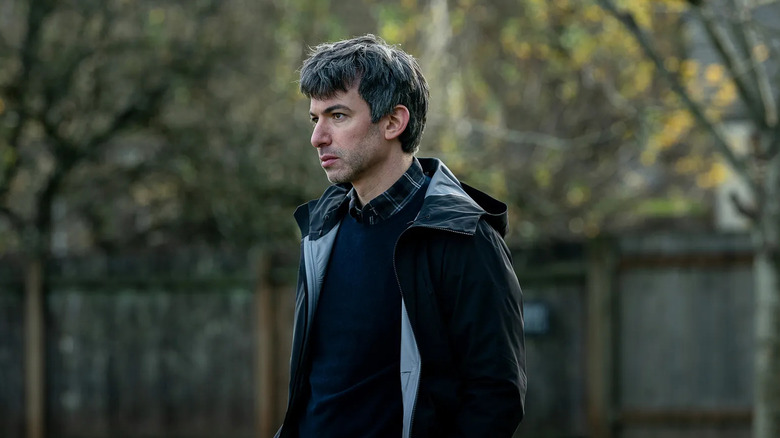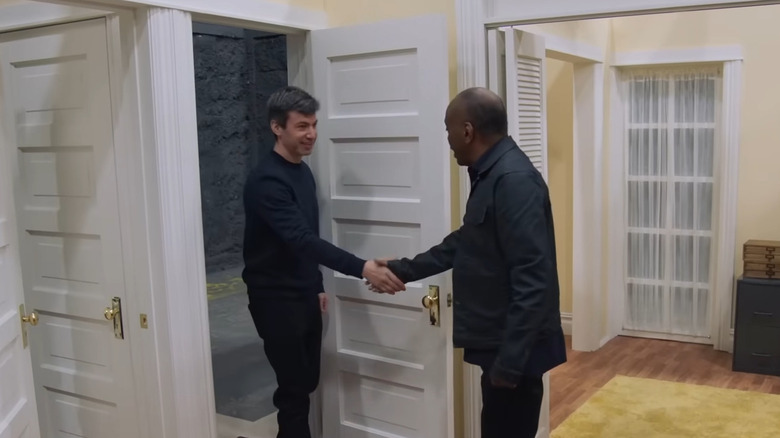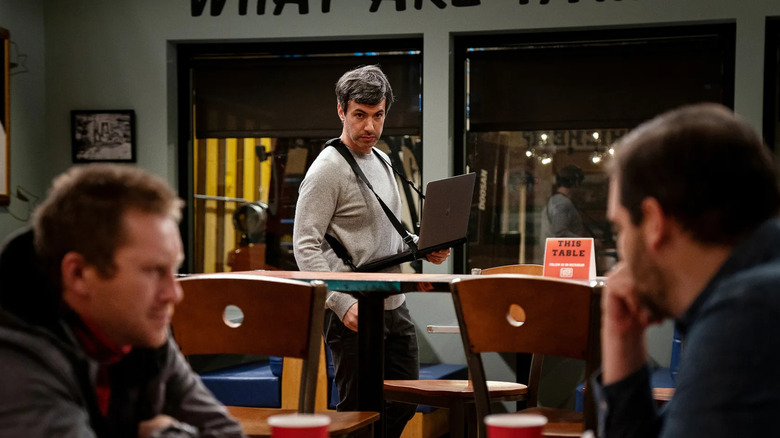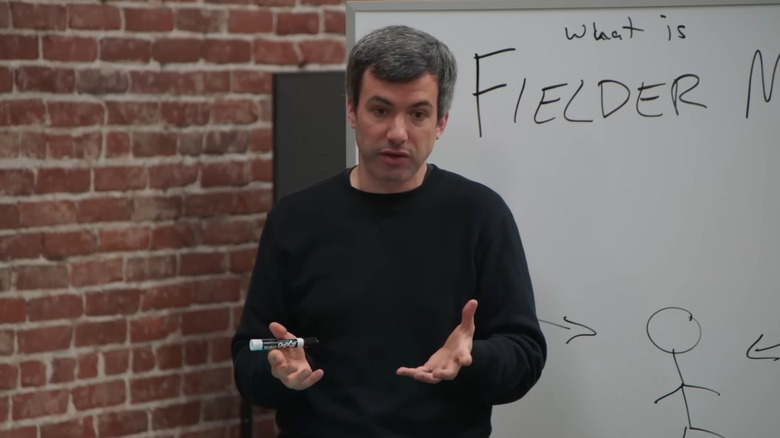Is The Rehearsal Manipulative? Let's Reenact This Scenario And Find Out
Warning: This article contains major spoilers for the first four episodes of "The Rehearsal."
If you've been following "The Rehearsal" for the past few weeks now, you're probably aware that Nathan Fielder's pseudo-reality puzzle has been the subject of contention for some. The premise of the HBO series initially revolved around the awkward comedian taking people under his wing to meticulously rehearse a scenario until it manifests into the desired outcome in reality, but the way in which Fielder has involved himself in his participants' lives has made this feel much more personal.
It's a mesmerizing, touching and shocking insight into the trials of trying to perceive the predictability of human nature. In the series premiere, Fielder attempts to help Kor Skeete, a Brooklyn teacher with a penchant for trivia, formulate the timeline of events so he can feel comfortable telling his long-time trivia partner that his master's degree has been a facade. But long before Fielder reveals the insane full-scale replica of the bar they'll be rehearsing in, Fielder confesses that their first meeting, and the conversation herein, was, in and of itself, a part of his own rehearsal.
Fielder had sent in his crew, posing as gas workers, to take pictures of Skeete's apartment, which in turn would be used to construct a heavily detailed full-scale replica of his apartment. Using Skeete's faux apartment, Fielder practices their first interaction, including the revelation that this seemingly organic interaction is not as spontaneous as Skeete was led to believe.
Within the first rug pull, it becomes clear that "The Rehearsal" is way more than a "Nathan For You" redux. It's the evolution of Fielder's method, and with that came a flurry of reactions from all corners of the internet on whether his actions are manipulative or not.
Fielder's experiment has garnered divisive reactions
Twitter has been embroiled in controversy (because water is wet) on whether "The Rehearsal" is taking advantage of its subjects. People had been talking about the show prior, but it was around the time that Richard Brody's piece from The New Yorker about Fielder's "cruel and arrogant gaze" came out that discussions thrust it onto the discourse train. Brody believes that Fielder's reigning authority ultimately dismisses the people at the center of his experiment:
"If the series is meant to be comedy, so much the worse, for making light of problems that matter to the participants — and for making even lighter of the deceptions to which he subjects them."
On the other side, you have Adrian Horton from The Guardian who believes that labeling the show as purely callous manipulation are missing the point:
"Of course it's manipulation – the discomfort with a person's portrayal, its perceived fairness or unfairness, is a core tenet and landmine of making television about real people appearing more or less as themselves."
Most people, myself included, appear to align with Horton's way of viewing Fielder as the ringleader of this wild circus ride. I think it's wise to keep in mind that no one is exempt from criticism, especially reality television, but it's difficult to use manipulation as a "gotcha" when Fielder doesn't hide any of his outlandish tactics to the viewing audience. There's a difference between manipulation and exploitation, and it's clear which one Fielder lands on.
Reality television is inherently manipulative
Reality television often asks us to take what we're seeing at face value. But if you've ever seen a reality show before, you know this isn't the case. If you took out all of the dramatic music stingers behind Gordon Ramsay's kitchen outbursts, you'd just be left with the awkward silence behind it.
You don't hear that because it wouldn't make good television. The camera sees a portion of the big picture, and the editor sees what the creative team wants us to see. It's less an issue that lies with Nathan Fielder, and more with reality television in general.
To answer the question, yes, "The Rehearsal" is manipulative, but if you're even vaguely aware of Fielder's line of work, he's not exactly trying to hide that. "Nathan For You" would test its subjects to see how far they would be willing to go if someone like Fielder suggested something wildly outrageous, such as setting up a legal smoking precedent in a dive bar under the guise of performance art.
Fielder always finds himself in the company of fascinating people, and often uses his process to undress their nature for the camera. Case in point: After the devout Robbin decides he's going to stay the night at Angela's to help raise the fake baby, Fielder accompanies him to his apartment to pack some things. That one trip gives Fielder the opportunity to show some insight into the chaos of Robbin's life, and his lack of mayonnaise ownership.
Throughout "The Rehearsal," Fielder has been more upfront about things like child labor laws, emotional honesty, and the ethical nature of his own show. It's in the series' fourth episode, however, that undresses Nathan's television maneuvers for what they really are.
Episode 4 puts things into perspective
In episode 4, Fielder recognizes that his entire process is in some way designed to manipulate the performance. This is where the show goes full "Inception." To recruit background actors for his rehearsals, he sets up an acting school in LA called "The Fielder Method." Throughout the classes, Fielder starts to notice that one student named Thomas is having a hard time getting into the unconventional groove of Fielder's approach.
In order to see things from his perspective, Fielder hires more actors to play the actors in his class, while he embodies Thomas. He then proceeds to experience said class from Thomas' perspective. The more times Fielder experiences his own method, the more he understands the lengths of which his entire operation is sculpted to manipulate the performance. Lila Shapiro from Vulture understands as much:
"Fielder understands that when people go on reality TV, they have certain expectations for how they're supposed to act. In his own shows, he uses a variety of tactics to throw his subjects off-balance — needling or misdirecting them, sitting in excruciating silence until they crack."
The most important revelation happens when Fielder recognizes how deeply authenticity can be skewed by the knowledge of simply being on camera.
At its base, "The Rehearsal" is a consistently hilarious pseudo-reality bit with a surrealist bent, and at its most reflective is Fielder at his most introspective, questioning the legitimacy and emotional resonance of his entire operation. The show has always been about Fielder more than anything else. "The Rehearsal" thrives on manipulation and that's what makes it so great. With only two episodes left to go, who knows what other kind of mind-bending rug pulls Fielder has in store for us?
"The Rehearsal" airs every Friday and is currently streaming on HBO Max.



